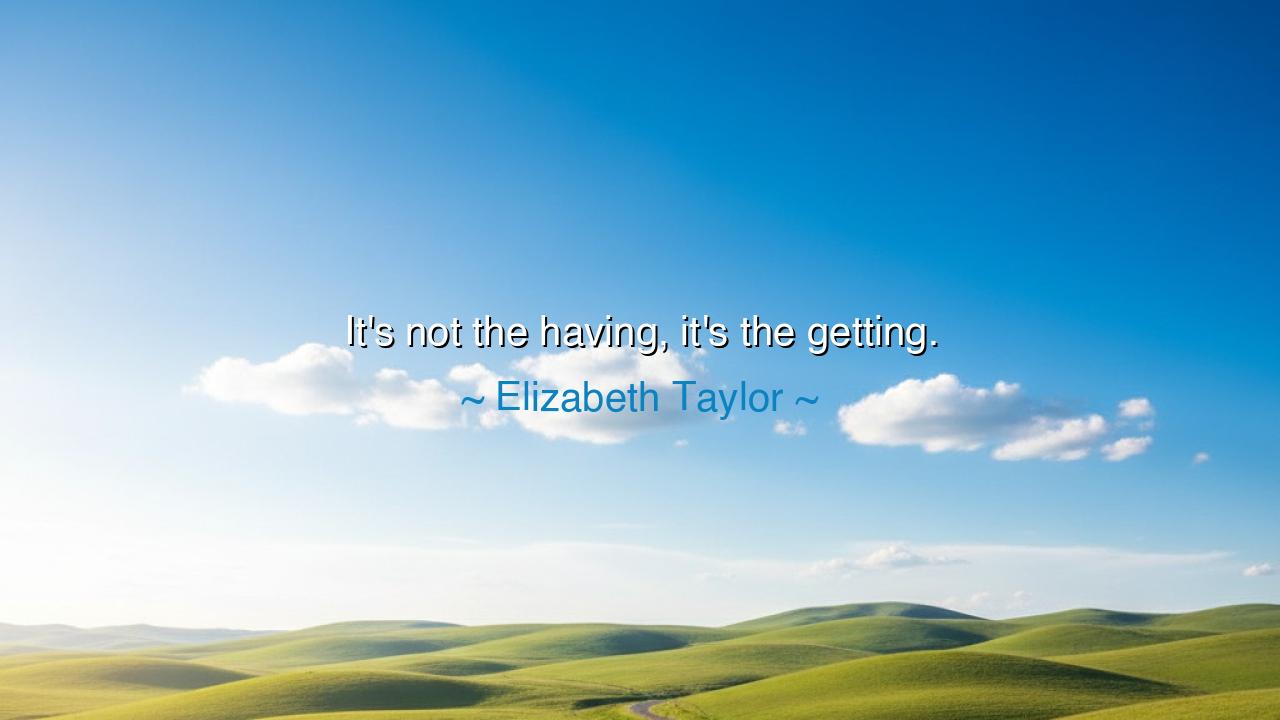
It's not the having, it's the getting.






"It's not the having, it's the getting." Thus spoke Elizabeth Taylor, a queen of the silver screen, yet her words reach beyond jewels and fame into the marrow of human desire. She unveils the truth that joy often dwells not in possession but in pursuit. The heart leaps not when it sits in plenty, but when it strives, hungers, and wins. To have is to rest; to get is to live.
The ancients knew this well. The warriors of Greece felt glory not in the crown upon their brows, but in the sweat, the clash of swords, the striving toward victory. For once the prize is secured, its luster begins to fade. But in the quest, in the getting, the spirit is aflame with purpose. Thus man is made not for idleness, but for the struggle that shapes him.
Consider the explorers who sought the New World. When Columbus crossed the ocean, his getting was filled with peril, hope, and discovery. The seas were wild, the path uncertain, yet his spirit burned with the grandeur of pursuit. But once the lands were found, the toil gave way to conquest and possession, and much of the glory dimmed into sorrow. The journey, not the having, was the fire that lifted men’s hearts.
So too in the life of Taylor herself. Though she gathered treasures, fame, and love, she confessed that the thrill was in the getting—the chase of beauty, the spark of romance, the hunger that made life vivid. Possession brought rest, sometimes even boredom, but pursuit brought fire. She echoed the wisdom of ages: man delights more in the chase than in the cage of what is caught.
Therefore, let this truth be passed down: do not set your heart on mere having, for it soon grows hollow. Set it instead on getting—on striving, seeking, daring, and reaching. For in the journey lies joy, in the struggle lies meaning, and in the pursuit lies the flame of life itself. When you no longer burn to get, you cease to truly live.






ANHoai Anh Nguyen
Philosophically, I’m torn. Desire powers discovery, enterprise, even art; yet many wisdom traditions caution that craving destabilizes contentment. How do we reconcile the engine with the anchor? Is there a middle path where we enjoy pursuit while continually practicing enoughness—gratitude audits, constraint-based design, or intentional plateaus? I’d love a perspective that treats longing as a tool, not a tyrant: when to lean into appetite for change, and when to sit still and let satisfaction be an achievement in itself.
LHlong hoang
Career-wise, this reads like a warning about the arrival fallacy. Hitting a title or compensation target often feels oddly flat, so we lurch toward the next target. How can organizations design goals that reward progress without fueling burnout—say, mixing outcome metrics with craft goals and recovery metrics? I’d value concrete tactics: quarterly celebrations of learning, sabbatical ladders, or rotating stretch roles. What indicators show a team is thriving on purposeful growth rather than being whipped forward by emptiness?
NNNha Nguyen
In relationships, it raises a red flag. The early chase can be intoxicating, but long-term connection requires different muscles: patience, repair, shared projects. How do we cultivate forms of excitement that don’t depend on newness—adventure planning, learning together, or rotating roles of leading and supporting? I’d like a framework for recognizing when someone is addicted to beginnings and how to gently pivot toward depth. What rituals make stability feel alive rather than like a dim afterparty for the first spark?
QKTran Quoc khanh
Creatively, it resonates. Drafting, rehearsing, iterating—those phases feel electric, while finished work sometimes lands with a surprising thud. But if the process is everything, how do we avoid never shipping? Could you outline a maker’s cadence that honors exploration yet rewards completion—perhaps time-boxed sprints, a “done” journal, and a public release habit? I’m curious how artists and founders keep curiosity vibrant without letting perfectionism or novelty-seeking prevent the final handoff where the work meets its audience.
HNpham hoang nguyen
This line makes me uneasy about consumer habits. If the joy sits in acquisition, aren’t we tempted to click “buy” again and again, ignoring environmental costs and the labor behind the package? What ethical guardrails could redirect that spark toward repair, lending libraries, or experiences that enrich others too? I’d appreciate a perspective on re-engineering the rush: can we get similar excitement from learning a skill, completing a community project, or rotating possessions so their utility—and our gratitude—stay alive longer?